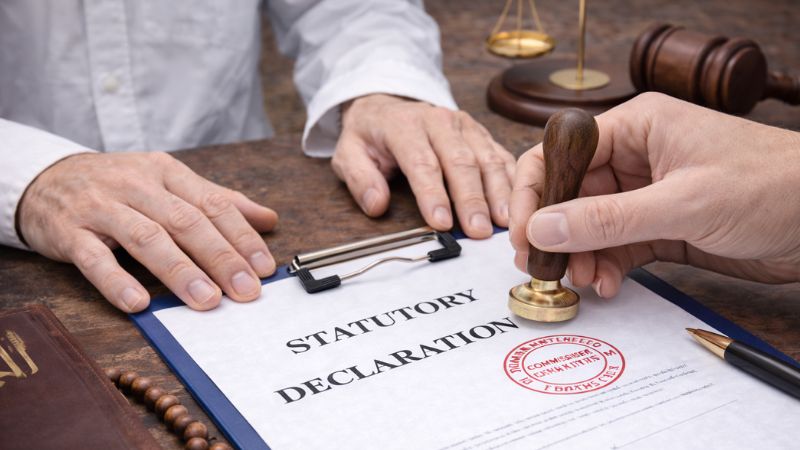When you need to officially declare something to be true in Singapore, you will have to make a statutory declaration. You may need it when recovering lost documents, changing your name, applying for an inheritance, witnessing some facts, and many other situations. Below, we explain how to make a statutory declaration in Singapore, when you need one, and what to expect from a statutory declaration lawyer.
Key Takeaways
- A statutory declaration is a written statement declaring something to be true.
- You need to sign and swear or affirm the statutory declaration before a Commissioner for Oaths.
- You may be required to make a statutory declaration to declare facts and provide evidence when you engage in court proceedings in Singapore or interact with government institutions.
What Is a Statutory Declaration?
A statutory declaration is a written statement where you declare some facts to be true.
In Singapore, statutory declarations shall be made according to the format provided in the First Schedule of the Oaths and Declarations Act.
How to Make a Statutory Declaration?
When you make a statutory declaration for any purpose, you need to make it in writing, sign it before a Commissioner for Oaths (CFO), and declare the information to be true under oath or affirmation.
In Singapore, a Commissioner for Oaths for statutory declarations could be a practising lawyer who is at least 35 years of age with at least 10 years of legal practice.
The steps to make a valid statutory declaration include:
- Making sure you understand what you plan to declare,
- Obtaining a form for a statutory declaration online or with the Commissioner for Oaths,
- Completing the form in writing, ensuring accuracy of all details,
- Visiting a Commissioner for Oaths in Singapore with your NRIC or passport,
- Signing and affirming or swearing the statutory declaration before the CFO.
When Is a Statutory Declaration Needed?
When you turn to the court or interact with government agencies in Singapore, you may be required to file a statutory declaration along with your application. By making a statutory declaration, you declare the information in your filings to be true and bear responsibility for any false statements.
Common scenarios where you may need to make a statutory declaration in Singapore include:
Loss of Documents
When you have your documents lost or damaged, you can apply to a relevant government agency for replacement. In some cases, you will also need to complete a statutory declaration to accompany your request.
For example, Singapore’s Immigration and Checkpoints Authority (ICA) requires a written request and completed statutory declaration for the recovery of lost or damaged Citizenship Certificates. For specific cases, it’s always best to check the exact requirements on the agency’s website or consult a lawyer on restoring your lost documents and making statutory declarations.
Name Change Declarations
In Singapore, you can change your name with a deed poll that is signed before a Commissioner for Oaths. In specific situations involving name change for minors, you may also need a statutory declaration to affirm details.
Change of Particulars
When changing particulars on the documents, for example, your name, address, and other details, you may be required to confirm your details with a statutory declaration in certain cases.
Witnessing Events or Facts
As a statement made to declare something to be true, a statutory declaration can serve as evidence in court or before government institutions. In the absence of other proof, a statutory declaration can be used to attest to events or facts.
Business and Corporate Matters
In business matters, statutory declarations help confirm authority, financial situation, and other facts. Common examples include a statutory declaration filed by the board or directors about solvency, revenue, patent use, and other business matters.
Immigration Purposes
When foreigners interact with the Immigration and Checkpoints Authority (ICA) in Singapore, they may be required to prove various facts through a statutory declaration. For example, foreigners need to support their application for the replacement of a re-entry permit with a statutory declaration.
Estate and Probate Matters
When you are required to prove your relationship to the deceased in probate and estate matters, you may need to confirm it using a statutory declaration. Other situations where a statutory declaration can be requested include applications related to the deceased’s CPF money.
Property Transactions
In property transactions, the real estate agents declare that all information provided about the transaction is true and complete by way of a statutory declaration.
Additionally, you may also need to provide a statutory declaration to prove some facts for obtaining various permits or moving a deal forward. For example, foreigners often need to provide a statutory declaration on owning any residential property in Singapore.
Employment Verification
In workplace situations, employees may need to provide a statutory declaration to complete a background check or confirm other facts.
For example, some employees of law firms, such as law clerks, may need to affirm in a statutory declaration that they are not suspended from practising law in any jurisdiction and that there are no other material facts affecting their eligibility.
Academic Records
Similarly, when your academic documents are damaged or lost, a statutory declaration can help verify your qualifications and eligibility.
How IRB Law Can Help
When you need to make a statutory declaration to accompany your applications with government institutions or your filing to the court, you must sign it before a Commissioner for Oaths.
At IRB Law, our experienced team of Commissioners for Oaths in Singapore offers efficient and convenient service to:
- Provide you with general guidance on making statutory declarations in all types of situations,
- Source the required forms for statutory declarations,
- Verify your identity before signature,
- Act as a witness when you declare facts to be true,
- Take oaths and affirmations,
- Arrange for remote witnessing and electronic signing of statutory declarations as required.
Conclusion
When you interact with government agencies or participate in court proceedings, you may be required to declare your statements or filing to be true by the way of statutory declarations.
When making a statutory declaration, you need to follow applicable legal requirements, including making an oath or affirmation while signing the declaration before the Commissioner for Oaths. For more information or to arrange for Commissioner for Oaths services for statutory declarations in Singapore, please don’t hesitate to contact the IRB Law offices.
FAQs
Can I make a statutory declaration online?
Yes, the new amendments to the Oaths and Declarations Act 2002 allow making a statutory declaration before a Commissioner for Oaths in Singapore, who offers the option of remote witnessing and electronic signing in place of wet-ink signing.
If you are interested in remotely signing a statutory declaration in Singapore, please contact IRB Law Commissioners for Oaths to arrange this service.
How can I make a statutory declaration when I’m not in Singapore?
If you are outside of Singapore in one of the Commonwealth countries or the UK and need to make a statutory declaration for Singaporean government agencies or court proceedings, you must sign it before a Notary Public. When outside of Commonwealth countries or the UK, you need to sign a statutory declaration before a consul or another authorised person in that country.
Should I sign the statutory declaration before it’s sworn or affirmed?
No, you should sign the statutory declaration before a Commissioner for Oaths simultaneously when making an oath or affirmation.




